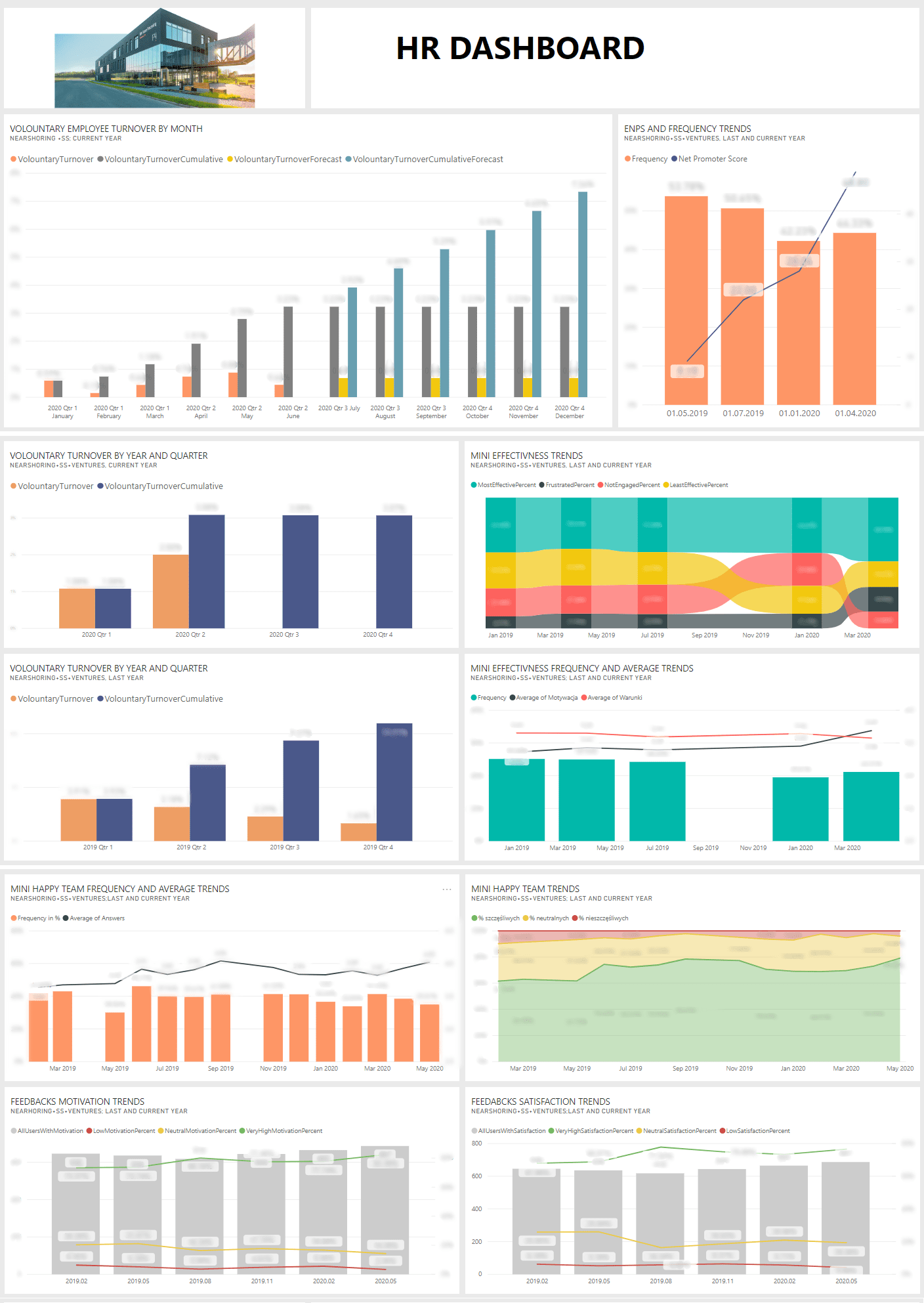
How does the organisational culture influence IT operations?
Recruiting top IT talent is a struggle. According to research, IT roles represent the 6th most demanded professions in the world. So, how IT companies manage to attract talent? We asked Tomasz Ciapała, our Chief People Officer, who explained the importance of organisational culture to attract, engage and retain IT employees.
What is organisational culture?
It is certainly an inseparable part of every workplace, regardless of whether it is consciously shaped, described by values, monitored or is simply the result of an accidental collision of the personalities of people who work in the company, of the strategy the company has, management style and business environment.
For me, it is the sum of behaviours of people who make up the organisation which often results from their perception of the company and their perception of their role in the company. These are both, described, approved procedures for dealing with specific situations and behaviours that we reveal when we encounter a new situation, as well as very subtle matters that hardly anyone would be tempted to describe, like smiling at your colleagues or holding the elevator for a person. I believe that organisational culture has a huge impact on how the company is doing on the market.
How should we understand company culture in order to benefit from cultivating it in the long run?
As I said before, first of all, you need to realise that your company already has an organisational culture and you can’t give it up. Secondly, bear in mind, it is something that can decide about the success or failure of your company, and thirdly you can leave it to chance and hope that what will be will be or, which is the approach I strongly recommend, try to cultivate this culture.
What should come first – culture or organisational strategy?
The company’s strategy is something that will help you reach a certain goal, an idea you have in order to achieve results. In the world of VUCA, strategies are very dynamic, often changed and adapted to the situation. It is a bit different with culture, though. It often results from the company’s history, from the beliefs of the people who create it. It is hard to imagine changing organisational culture each time a new strategy is implemented.
At the same time, looking at culture as a certain resource that the company has, it should be included in the strategy and derived from it, so that is can be a competitive advantage.
How to identify organisational culture suitable to your organisation?
First of all, organisational culture should not conflict with our own beliefs. To a large extent, these unmanaged organisational cultures which I mentioned earlier, result directly from what the person who manages the company believes in. If by nature, I am a distrustful man, I protect myself on all fronts, I believe that everyone wants to cheat me it will be very difficult for me to build a company whose basic values are trust and cooperation.
Secondly, you should think about what is most important in the business in which you operate: teamwork or maybe individual, specialised competencies, long-term relationships or quick, short-term contracts etc. These aspects should be looked at from the perspective of your potential customers and employees, i.e. people co-creating the company.
How to influence the emergence of organisational culture and how to change it? Is it even worth doing?
While in most companies, especially at the beginning of their functioning, culture is formed in a natural way, it changes when the company begins to grow. New branches of activity, additional employees, separate business units mean that the original culture can change significantly and go beyond our control. Then, it is worth taking a conscious approach to the matter of culture.
One of the basic elements that you should start with is defining the company’s values and mission according to which it should operate. It’s best to involve as many team members as possible. Saying your beliefs out loud, writing it down, showing some examples – it all helps you understand what kind of company you are, what kind you want to be and what to avoid. It is worth returning to these elements, especially when important decisions are to be made, refer them to your company’s mission and values.
In the next step, it is worth considering the aspect of cultural fit when recruiting, especially for senior positions. This is a mutually beneficial activity because people who adhere to completely different values than are respected within your company will not feel well in it, will never be fully efficient, and will not be good employees.
You should also talk to clients about it, look for companies with similar organisational culture. A fairly vivid example of how an organisational culture functions in a given company is the approach to the so-called ‘exceptional situations’ for which there is no procedure so far. Such examples reveal how we think in a given company, what we believe in and how we behave.
When it comes to changing culture, it depends heavily on how much change you want to make. Culture cannot be changed 180 degrees overnight. However, there are types of organisational cultures that are a bit more plastic and can be easily managed. That is why it is worth observing it all the time, verifying how our current culture helps us in implementing the strategy and what elements of it are worth changing.
Can organisational culture be quantified? Why should we do that?
When it comes to measuring, it is a bit harder with organisational culture than with, say, financial data, but it is also not true that you can only “feel” it.
As I said, culture is the sum of beliefs and behaviours of people forming a company and these can be observed and even measured. Again, depending on the type of culture, different measures will be applied, but I am convinced that you can prepare the right set for each. For example, if Future Processing’s culture is built on openness and trust, you can measure each person’s trust in their superiors or management. Such a study can be organised regularly by an external company to maintain the credibility of the results. It allows you to observe trends and respond appropriately.
Of course, measuring culture is necessary if we want to approach and manage it consciously.
Which aspects of organisational culture are crucial to us at Future Processing?
Our culture is built on values that were defined by our employees many years ago: quality, passion and commitment, atmosphere, team spirit and development, and its main elements are human as well as openness and trust.
How do we take care of that?
First of all, we look at all of us as one big team. We all want to feel good in the company and we want the company to be successful: it is our common goal. This approach is associated with very extensive communication: access to most data about the company for each employee, publishing information about how the company is doing on a quarterly basis, inviting to discussions, informing about company events, sharing news from individual projects, successes that we have achieved, but also telling about failures, about what we could have done better.
We try to remove all barriers that can cause the feeling WE – YOU. An example would be a meeting of board members with the whole team once a year, but also f2f meetings of board members with newly employed people, lack of special offices for managers or designated parking spaces.
Focus on teamwork is manifested in the fact that we have about 50 teams with rarely changing composition. In teams, the leader cares about achieving goals but also about its integration, development and continuous improvement of operating methods. What’s more, we strongly promote feedback culture. Every employee has at least 4 official feedback conversations during the year and unofficial ones whenever necessary.
The development is also manifested by the establishment of a special training unit called FPAcademy responsible for organising training, conferences and language classes for members of our team, but also taking care of almost unlimited access to books in our library, initiatives for the exchange of knowledge between members of individual teams, workshops and, taking into account current situation, moving these activities on-line.
We are constantly working on maintaining a family atmosphere, even though the company has over 800 employees at this moment. We celebrate the company’s birthday, we eat dinners together, we share cakes for work anniversaries, we drink coffee together, we organise a programmer’s day, an Olympics or we engage in charity activities together. In practice, we have a whole department that deals with internal and external communication and branding.
Most importantly, we listen to each other very carefully, everyone has the right to express an opinion and no question remains unanswered.
Although, as a company with 20 years of experience, many elements of our functioning are described in procedures and we have certain patterns of behaviour, we always approach special cases with a lot of attention and, if there is no procedure, they are handled in accordance with the values that guide us.
How do we and our customers benefit from it?
In short, customers are satisfied and employees are satisfied. A team that comes to work with passion and works in an atmosphere of mutual cooperation and respect provides customers with more value than people forced to work and strictly controlled. What’s more, thanks to such culture our attrition rate is significantly lower than the industry average, which translates into lower costs for us and our customers. We also have no problem finding new employees, which is not so obvious in the world of the employee market.
Which elements of Future Processing’s culture are the most valuable to us in the pandemic or why?
I would rather avoid saying that this element of culture is better than that, but I will try to answer differently – mutual trust was always very important to us and for this reason, we have never introduced control mechanisms known in other companies.
In the case of COVID-19, many companies have been forced to start working remotely overnight. I know that this has generated a lot of stress on many levels: management worried that remote employees would not work efficiently enough and that they would lose control, as well as employees afraid that without showing at the office they could be accused of slipping around. At Future Processing, we didn’t have this problem at all and we literally switched to remote work within one day: nobody wondered how to control anybody. It was clear to everyone that this was our common challenge. Trust combined with passion and commitment meant that the company continued to operate with the same efficiency and effectiveness as before, which was later confirmed by our customers.
How to develop these aspects of culture in an organisation?
First of all: be an example and lead by example. If you want people to trust you, then trust them. Secondly, notice the behaviours that are compatible with the culture and talk about them, praise them, show them. At the same time, do not ignore those that are contradictory, do not wave your hand and say “whatever, what will be, will be.”
How do we approach measuring culture at Future Processing? Do we have cultural KPIs?
We do, although we don’t call them that. We measure the perception of Future Processing by our employees on many levels, including how do they perceive the cooperation with their leader and with their colleagues. We examine the involvement of people in the life of the company, reactions to company news. We verify self-development aspects: training budget, number of certificates, number of people trained. We analyse the results of feedback conversations – some of which are quantified (e.g. engagement assessment). We talk to new employees after first months of their employment because such a fresh look often shows something that older employees no longer see. We measure the reasons why people leave the company etc.
To collect this data, we use our internal systems and the help of external companies that organise comprehensive research for us. Having such a database helps on make decisions about whether to change something, in which direction should we go etc. – this system has been working for many years.
As you can see, there are many aspects that constitute company’s culture, making it a great place to work. Even though it may seem difficult at first, it is definitely worth cultivating because convenient workplace attracts more employees and helps retain them for longer.




